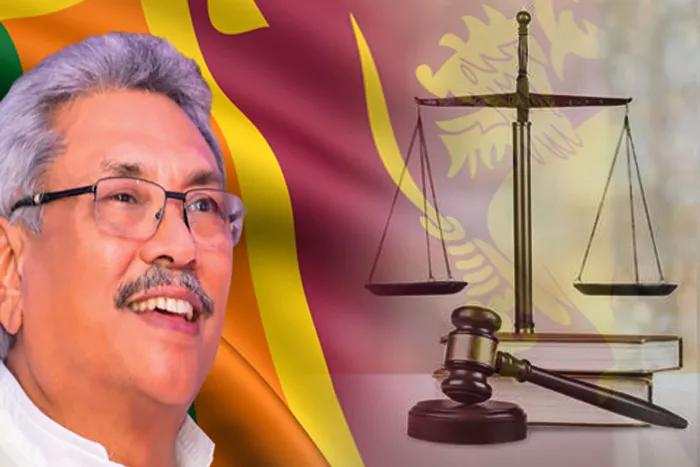
Newly appointed Chair of the high-level task force ‘one country one law’ in Sri Lanka, Ven Gnyanasara, invited the youth who suffered due to ‘racial, religious and provincial divisions’ to submit their ideas and suggestions to the Task Force as it seeks to implements its objectives. Therefore, the youth have a special place in this process. President Gotabaya has promised Sri Lanka ‘vistas of prosperity and splendour’; prosperity is absent, with Sri Lanka going through a grave economic crisis, and hundreds of youth publicly displaying their displeasure by queuing up at the immigration and consular departments to migrate out of Sri Lanka. The economic destitution and the daily struggle with high cost of living in Sri Lanka have worsened with the country’s economic crisis, and the youth migration is a severe loss in terms of brain drain for a developing nation. In the past, Sri Lanka faced two youth insurrections leading to the loss of thousands of lives. Today, another generation is fleeing the nation. The ultra-nationalism projected by the political environment will fuel the burning fire and not ease the present socio-political concerns. Adding to the domestic concerns is another brewing external factor—the Chinese pressure in Sri Lanka.
The Leninist centralisation that Deng Xiaoping followed was the exact prescription Xi adopted, which has successfully worked in mainland China and there are now plans to expand the Chinese sphere of influence to the BRI nations, including Sri Lanka.
Chinese Communist Party General Secretary, Xi Jinping, has championed an effort to build a new party–state legal system where party rules and state laws coexist as an organic whole. “As paradoxical as it may seem, Xi’s ideology is centred around the idea of ruling according to the law,” said Ling Li, a scholar of Chinese politics at the University of Vienna, who argued that Xi might resurrect the Mao-era “Party Chairman” title next year as he enters the third term. The agency of General Secretary Xi has grown over the last few years to all levels and institutions. The Leninist centralisation that Deng Xiaoping followed was the exact prescription Xi adopted, which has successfully worked in mainland China and there are now plans to expand the Chinese sphere of influence to the BRI nations, including Sri Lanka. China is projecting this ‘national rejuvenation’ in full force, altering the playbook in many geographies, and Sri Lanka has become a victim due to China dependency.
The fertiliser case
China blacklisted a reputed Sri Lankan Bank, the Peoples Bank, over a US $42 million fertiliser shipment from China. The Chinese embassy in Colombo tweeted the blacklisting. The Sri Lankan authorities sent back a recent Chinese ship with 20,000 tons of the fertiliser, due to harmful bacteria in the shipment in October. The Chinese authorities have defended the high quality of their export from Quingdao Seawin biotech company. Surprisingly, the same ship, ‘Hippo-Spirit,’ was rechristened as ‘Seiyo Explorer’ and re-entered with the same consignment in November, this time closer to the southern Hamanthota Port built by the Chinese. The ship deactivated its automatic identification system (AIS) and renamed itself in mid-sea. China is using its influence to get the contaminated fertiliser consignment offloaded on the island regardless of the rejection. The extent to which China would go from blacklisting the bank to renaming the ship shows China’s significant ‘push’ factor and depicts the apparent weakness in Sri Lankan institutional capacity—such as the foreign ministry—to defend the blacklisted local bank and pressure China to adhere to the local test data. The Chinese wish to take a third-party assessment on the fertiliser, again undermining Sri Lankan expertise, which could be used for many future shipments to bypass the local process. China’s capacity to manoeuvre supply chains is exemplified by this case, where Sri Lanka is being pressured and is a victim of its heavy dependency on Chinese loans.
China is altering the rule book and standards to suit and pressure the local policymakers in countries like Sri Lanka. The significant growth of Chinese agency over Sri Lankan elites, government institutions, and media space was captured as ‘high risk’ by a recent comprehensive report on China’s influence in South Asia: Vulnerabilities and Resilience in Four Countries’ by the Carnegie Endowment. The growing agitation amongst the public over Chinese loans is a serious indicator of this development. The report aptly highlights the ‘high-risk’ Sri Lanka faces from China when it comes to potential capture of “influential elites and key individuals in Sri Lanka’s vibrant and robust media, as an alternative to politicians to get their view across to the public’. The report further states that, “issue of captured or capturable elites by China is more relevant in Sri Lanka than in Bangladesh.”
China’s capacity to manoeuvre supply chains is exemplified by this case, where Sri Lanka is being pressured and is a victim of its heavy dependency on Chinese loans.
Chinese influence over the ruling political party and government administration has impacted the state institutions and has been listed in the report as ‘medium risk level’, which should be given serious consideration since it will alter the democratic process, inviting an alternative China model. Reversing China’s belligerent behaviour will be challenging and will require diplomatic finesse, commercial innovation, and institutional creativity on the part of many south Asian nations, and the report highlights essential recommendations for policymakers to consider. The recent fertiliser import dispute is an example of quality standards nations such as Sri Lanka should be concerned with when it comes to Chinese exports. Sri Lanka should focus on the infrastructure standards and transparency of Chinese loans, and transfer key strategic projects back to Sri Lankan ownership.
However, the US view of a ‘Chinese invasion’ falls short of the actual ground situation in Sri Lanka. While there is a significant increase in Chinese influence due to infrastructure investment, vaccines supply, and financial assistance, there is no Chinese invasion in Sri Lanka per se. China’s expansion strategy has accelerated after multiple global and regional events such as the Global Financial Crisis, the Trump Presidency, Brexit and the Afghanistan exit. However, it is too early to conclude a ‘China invasion’ as projected by several Pentagon officials, especially considering that regional power status is not always necessary to challenge a world power. Robert Gilpin argues that, ‘a rising power lacking regional hegemony could still challenge the hegemon globally over cross-cutting forms of control that sustain its global hegemonic order, such as economics, finance, tech and information’. A few weeks ago, China displayed its military capacity in hypersonic missile capabilities, which General Mark Milley, Chairman of the Joint Chiefs of Staff, called a ‘Sputnik moment’. It may sound alarming due to the hyped-up fear, but it is not a Sputnik moment. Rush Doshi argues, ‘what matters is not whether China has full regional hegemony but has built home region confidence that can manage the risk of hegemonic intervention if it pursues global expansion.”
China’s expansion strategy has accelerated after multiple global and regional events such as the Global Financial Crisis, the Trump Presidency, Brexit and the Afghanistan exit.
China has gradually built its confidence and its agency in Sri Lanka, Sri Lanka, with its present economic and political dysfunctionality, will be a lucrative ground for China’s expansion in the region. It is a long game for the Middle Kingdom. In the next decade, the United States needs to help states in the Indo-Pacific develop their asymmetric capabilities to deter Chinese expansionist behaviour. Sri Lanka will face serious headwinds due to its strong China factor; the ‘high-risk’ of capturability due to its political dysfunctionality now spreading to the most sensitive branch of government, and law and order.
The views expressed above belong to the author(s). ORF research and analyses now available on Telegram! Click here to access our curated content — blogs, longforms and interviews.




 PREV
PREV


